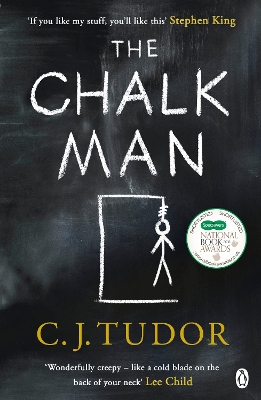Reviewed by Quirky Cat on
Warnings first: Quite a lot goes on this in this novel, despite its deceptively small size. Obviously based on the description you know that somebody dies, but more than that there’s sexual assault, bullying, suicide, and animal death. If seeing any of these describes upsets you, I would strongly urge you to prepare yourself before reading.
I was really excited when I saw The Chalk Man listed as an option for December’s Book of the Month (BOTM) selection. Seeing the tag “perfect for fans of Stranger Things” certainly caught my attention, being that I’m currently going through Stranger Things withdrawal. But if I’m being honest with myself, the book didn’t really live up to that description, or my excitement.
First the obvious reason why it didn’t quite read like the compared TV series; there’s no paranormal activity of any kind. It’s a group of kids/adults (remember, it bounces back and forth between the past and present) that get dragged into a situation that’s over their heads. That’s pretty much the extent of what they have in common however. Oh! I take that back; there is a bully as well. Though I’d argue that while he isn’t around nearly as long as the TV show bully, what he does is much worse. As mentioned above, I found the setup of the group to remind me of the one in IT, but it also lacks an evil clown entity, so there’s that.
I think the other reason I found myself underwhelmed with this novel was just how heavy handed certain elements were. There was an obvious trail that was laid out, with very little hidden beneath the surface. The metaphors were so blunt I almost feel like I can’t even call them metaphors. The bully who can’t accept who is really is, so he takes it out on everyone else. The vicar that’s actually a letch, and worse. The mother who is honest and good, but whose career is controversial. The hoarder who can’t let go of his past.
My last complaint is I feel like the novel broke the promise (the promise being more or less what it sounds like; we’re given to assume that the author will conclude the novel in a way that’s satisfying, makes sense, and doesn’t violate logic in the process. Usually this is all based off of how the novel as built up events). I don’t want to give away the ending, so forgive me to dancing around the subject here; something happens in the end that completely throws the events that had occurred previously in a different light. I would normally be completely ok with that, except the perspective never changes. The person that does said action is the same one telling us the story the whole time. It makes no sense to me that he wouldn’t mention (even mentally) these events that happened so early on, especially as they’re so important. Yes, it makes for a better story this way, but only during the buildup phase. The actual revelation was a massive disappointment to me, as I felt like I’d been lied to (and in a way, I had been).
I did find myself devouring this book, despite my complaints. So obviously I found it worthwhile to finish. Perhaps I’m so disappointed because of how much potential I felt it had? I would very much be curious to see what Tudor writes next, and follow her as her writing develops. I think she’s got a lot of potential, and is worth keeping an eye on.
For more reviews, check out Quirky Cat's Fat Stacks
Reading updates
- Started reading
- 17 December, 2017: Finished reading
- 17 December, 2017: Reviewed
